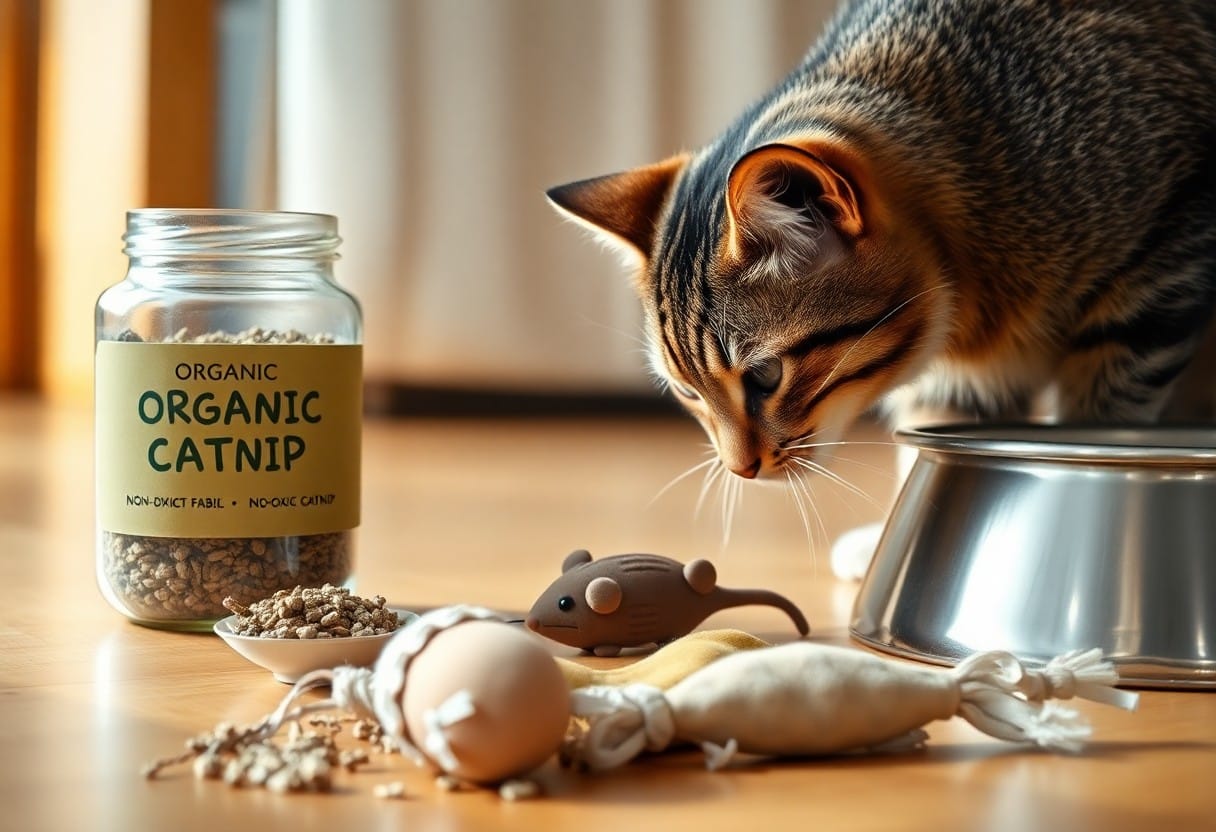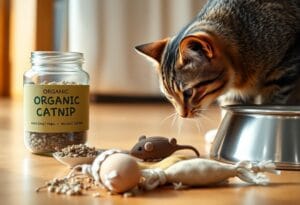Just imagine enhancing your cat’s diet with rare herbs that offer more than just flavor. By incorporating these unique botanicals into your homemade cat treats, you can provide health benefits that promote overall well-being. From boosting the immune system to aiding digestion, these herbs can transform ordinary snacks into nutritional powerhouses. In this post, you’ll discover which specific herbs are safe and beneficial for your feline friend, ensuring that your culinary creations are both delicious and wholesome.
Key Takeaways:
- Incorporating rare herbs such as catnip, valerian root, and rosemary can enhance the flavor of homemade cat treats while providing various health benefits, including improved digestion and increased relaxation.
- Using herbs like chamomile can help soothe anxiety and promote calmness in cats, making them ideal for stressful situations or changes in their environment.
- Essential nutrients found in herbs like parsley and mint can contribute to fresh breath and overall wellness, making them excellent additions to your cat’s diet.
Uncommon Herbs with Potent Benefits
Exploring uncommon herbs can unlock a treasure trove of health benefits tailored for your feline friend. These herbs not only enhance the flavor of homemade cat treats but also support specific health conditions, ensuring your cat stays vibrant and healthy. Incorporating these plants into their diet will provide them with vital nutrients, boosting their overall wellness.
Turmeric: The Golden Spice for Joint Health
Adding turmeric to your cat’s treats can significantly promote joint health due to its active compound, curcumin, which possesses anti-inflammatory properties. This spice not only helps in soothing discomfort associated with arthritis but also supports cellular health and digestive function. You can easily ground dried turmeric into their treats, allowing your kitty to reap its numerous benefits.
Catnip: The Calming Herb with a Twist
Catnip is a well-known herb that affects approximately 70-80% of cats, offering a euphoric and stimulating experience. Interestingly, it can also serve as a calming agent. The compound nepetalactone found in catnip has been shown to reduce stress and promote relaxation, making it an excellent addition to treats meant for anxious felines.
Using catnip in homemade treats not only provides your cat with enjoyment but also aids in managing their stress levels during changes in routine or environment. By incorporating this herb into playtime snacks or after stressful vet visits, you can help your cat achieve a sense of peace and comfort. Experiment with dosage; even a small pinch can make a big difference in your cat’s mood.
Herbal Allies for Digestive Wellness
Your cat’s digestive health can greatly benefit from certain herbs known for their soothing properties. Including herbs like chamomile and fennel in your homemade treats may help ease digestive troubles while impressively enhancing flavor. These herbs not only add a special touch but also promote overall health, making your cat’s snacking experience both delightful and beneficial. By incorporating these herbal allies, you can support your furry friend’s digestive system and add valuable nutrients to their diet.
Chamomile: Natural Soother for Stomach Issues
Chamomile is celebrated for its calming effects on the digestive system. This herb can help soothe an upset stomach, reduce inflammation, and alleviate discomfort associated with digestive issues. Incorporating chamomile into your cat treats can provide them with a gentle way to combat stress-induced tummy troubles, allowing your kitty to feel more at ease and content.
Fennel: The Gas-Relief Guru
Fennel stands out as an efficient remedy for bloating and gas in cats. This aromatic herb not only enhances flavor but also promotes improved digestion by stimulating the production of digestive enzymes. Including fennel in treats can help reduce gas and ensure that your cat experiences a comfortable digestion process. This herb’s soothing properties can pave the way for a happier, healthier pet.
With its natural carminative properties, fennel helps to alleviate digestive discomfort by relaxing the gastrointestinal muscles, making it particularly effective against gas and bloating. A study conducted on animals found that fennel significantly reduced the formation of gas, showcasing its effectiveness. When you add fennel to your homemade treats, you’re offering your cat a snack that not only delights their taste buds but also supports their overall digestive well-being.
Antioxidant Powerhouses for Feline Health
Integrating antioxidants into your homemade cat treats can significantly boost your feline’s health. These powerful compounds help neutralize free radicals, lowering the risk of chronic diseases and promoting overall wellness. By choosing the right herbs with high antioxidant properties, you can create treats that not only satisfy your furry friend’s palate but also support their immune system and maintain a youthful vitality. Two exceptional antioxidant-rich herbs to consider are spirulina and ashwagandha, each offering unique health benefits.
Spirulina: The Nutrient-Dense Wonder
Spirulina is a blue-green algae known for its impressive nutrient profile, making it a fantastic addition to your cat’s diet. Packed with proteins, vitamins, and minerals, this herb supports energy levels and boosts the immune system. Rich in antioxidants, spirulina aids in reducing cellular damage and inflammation, enhancing your cat’s overall health while satisfying their taste buds.
Ashwagandha: The Stress-Buster Herb
Ashwagandha is a renowned adaptogenic herb that can help regulate your cat’s stress levels. It has been shown to combat anxiety, promoting a state of calmness and relaxation in your furry companion. Including ashwagandha in your homemade treats can assist in managing behavior problems related to stress and keep your cat happy and healthy.
Research highlights ashwagandha’s potential to lower cortisol levels, the hormone responsible for stress. This herb can enhance your cat’s adaptability to changes in their environment, whether it’s new pets, visitors, or other stressors. A small dose of ashwagandha in your treats can also improve your cat’s overall mood and vitality, leading to a more harmonious home life. Just be sure to consult with your veterinarian to determine the right amount suitable for your feline friend before adding this powerful herb to their diet.

Crafting Nutritious Treats: Recipes and Tips
Creating homemade cat treats infused with herbal health benefits can be both fun and rewarding. Begin by sourcing high-quality, organic ingredients and herbs. A basic recipe could combine whole grain flour, a protein source like chicken or fish, and your selected herbs. You might bake them into bite-sized morsels, ensuring they are crunchy and tasty. Take special care to measure ingredients accurately, aiming for a well-balanced treat. Tailoring your treats with specific herbs known for their health benefits can help keep your feline friend vibrant and healthy. Perceiving the positive effect of your efforts, you’ll love watching your cats thrive.
Blending Herbs with Safe Ingredients
Merging herbs into your treat recipes involves understanding which ingredients are both safe and beneficial for felines. While popular choices like catnip and parsley are generally safe, others may be less suitable. Always consider herbs known for their soothing properties, such as lavender, in small amounts, or rosemary for its antioxidant qualities. Focus on simple combinations such as a base of whole wheat flour, meat, and your chosen herbs, ensuring none contain harmful additives. Finding this balance is key to creating treats your cat will enjoy without health concerns.
Balancing Flavor and Health Benefits
Combining delicious flavors with herbal nutrients doesn’t require sacrificing taste. By carefully selecting complementary ingredients, you can create treats that appeal to your cat’s palate while enhancing her health. For example, blending chicken with a hint of mint can offer fresh breath and digestive clarity. Incorporate flavors like tuna or salmon — both protein-rich and loved by cats. Infusing these natural flavors with herbs like turmeric or basil enhances their treats’ nutritional profiles without overwhelming your cats’ sensitive taste buds.
Balancing flavor and health benefits in homemade cat treats involves experimentation and attentiveness to your pet’s preferences. Observing their reactions to various ingredients will guide you in perfecting each recipe. Start by introducing one herb at a time, noting any changes in their appetite, energy, and overall well-being. Through careful observation and gradual introduction, you can confidently create a range of treats that are not only tasty but also enriching, contributing positively to your cat’s overall health.
Maintaining your cat’s health while experimenting with homemade treats involves a careful selection of herbs. Certain plants, though beneficial for humans, can be harmful or even fatal for cats. Being aware of these risks will ensure that your feline friend enjoys treats that are not only tasty but safe. Prioritize your cat’s well-being by steering clear of harmful herbs and ingredients, which can create a dangerous environment for your pet.
Herbs that Are Toxic to Cats
Several herbs are toxic to cats and should be strictly avoided in any homemade treats. Garlic and onion are notorious for their potential to cause anemia in felines. Additionally, chives and rhubarb can lead to gastrointestinal distress and more severe health complications. While exploring new ingredients, make sure to thoroughly research each herb’s safety profile to prevent unintentional harm.
Consult Your Vet: When to Seek Professional Guidance
Engaging in a discussion with your veterinarian should be a key step before introducing new herbs to your cat’s diet. Your vet can provide tailored advice based on your cat’s health history and specific dietary needs, ensuring you make informed choices about what to include in your homemade treats. Additionally, they can help identify any potential allergic reactions or interactions with existing medications.
Before making significant changes to your cat’s diet, including new herbs or supplements, a consultation with your vet can be invaluable. They can advise if your cat has underlying health conditions or specific sensitivities that could affect how they process certain ingredients. Keeping an open line of communication with your veterinarian fosters a proactive approach to your cat’s health, helping you create safe and nutritious treats that enhance their overall well-being.
Summing up
Summing up, incorporating rare herbs like catnip, rue, and chamomile into your homemade cat treats can significantly enhance their health benefits. By using these herbs, you can support your cat’s digestion, boost their immune system, and even promote relaxation. Understanding the properties of these herbs allows you to create nutritious and flavorful treats that cater to your feline friend’s well-being. As you explore these options, always consult with your veterinarian to ensure they align with your cat’s specific health needs.
FAQ
Q: What are some rare herbs that can be used to enhance the health benefits of homemade cat treats?
A: There are several rare herbs that can provide significant health benefits when infused into homemade cat treats. One example is Catnip (Nepeta cataria), which not only adds flavor but can also aid in digestion and have a calming effect on some cats. Another herb is Chamomile (Matricaria chamomilla), known for its anti-inflammatory properties and ability to soothe upset stomachs. Additionally, Marshmallow Root (Althaea officinalis) can be beneficial for maintaining a healthy digestive system and reducing inflammation in cats.
Q: How can I incorporate these rare herbs into my cat treat recipes?
A: You can incorporate rare herbs into your cat treat recipes in various ways. For dried herbs like Catnip and Chamomile, you can crush them into a powder and mix them directly into the dough of the treats. Use about one teaspoon of each herb for every cup of flour in the recipe. If using Marshmallow Root, you can brew it as a tea first and then mix the strained liquid into the treat mixture. Always start with small amounts to see how your cat reacts before adjusting the quantity.
Q: Are there any potential risks associated with using rare herbs in cat treats?
A: While many rare herbs can offer health benefits, it’s important to use them thoughtfully. Not all herbs are safe for cats, and some can cause adverse reactions. For instance, excessive amounts of Catnip can lead to digestive upset. Before introducing any new herb, consult with your veterinarian to ensure it is safe for your cat, particularly if your pet has existing health conditions or is on medication. Moderation is key to providing a balanced and safe treat.

















